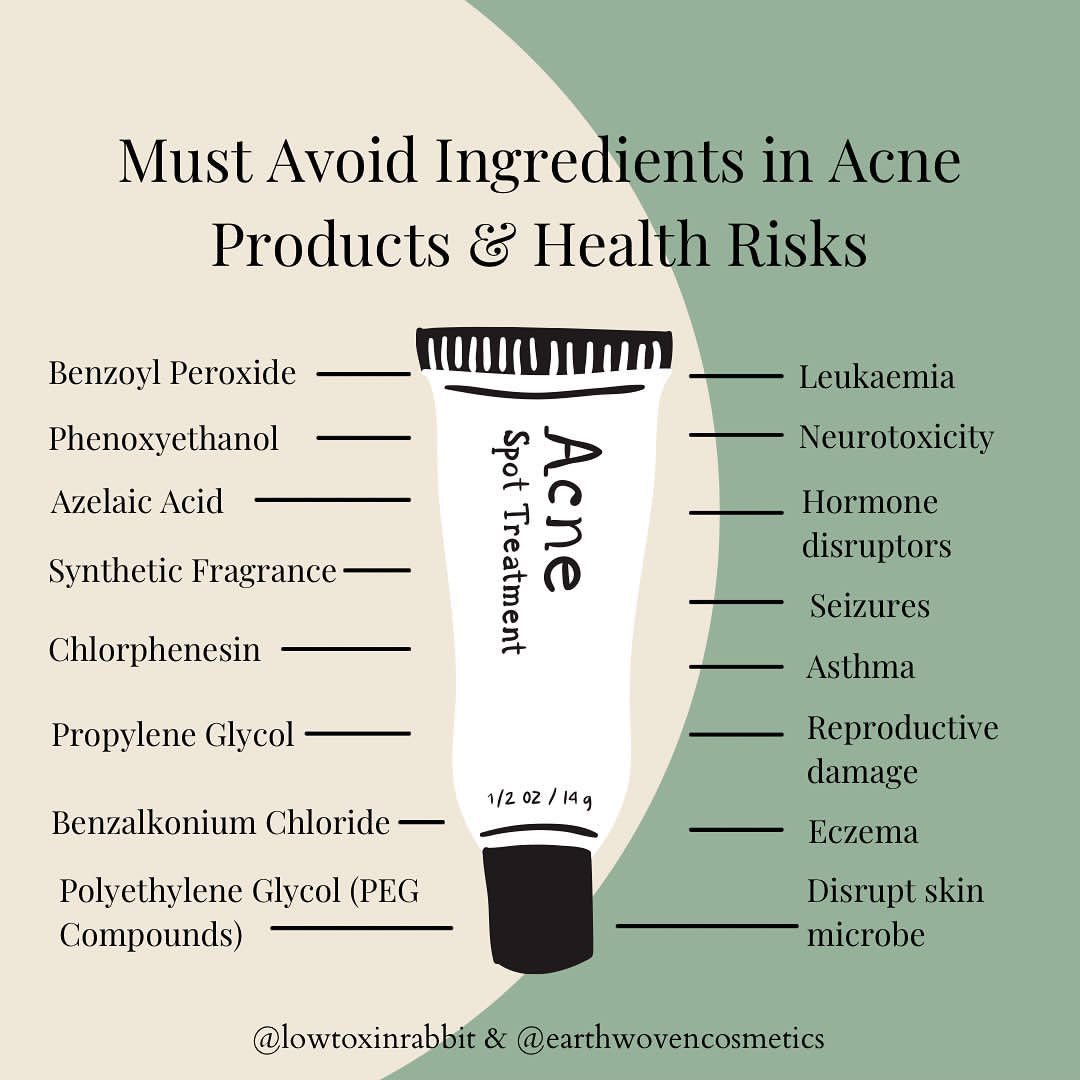
Benzoyl Peroxide Is Not the Only Ingredient to Avoid in Acne Treatments!
Share
There's been a recent buzz about the discovery of high levels of benzene in popular acne products containing benzoyl peroxide...
While this revelation is definitely alarming, it's just the tip of the iceberg when it comes to potentially harmful ingredients lurking in acne treatments. This issue is particularly important, as many teenagers use acne products and are most vulnerable to their side effects. It is crucial that we protect their health both in the short term and for the long term, and not fall for the latest skincare tik tok trend to pimple free skin. Let's take a look into the concerning ingredients found in common acne treatments and if there is a safer option.
Must Avoid Ingredients in Acne Products
Benzoyl Peroxide:
The recent spotlight on benzene formation in products containing benzoyl peroxide raises serious health concerns. Benzene is a known carcinogen, and prolonged exposure to high levels of this chemical can lead to leukaemia and other serious health issues. Additionally, many do not know that benzoyl peroxide is associated with contact dermatitis, allergic reactions, and the bleaching of clothing. That is right, bleaching your clothes! How can that be good to use on your face! While effective for acne treatment, the risks associated with benzoyl peroxide are definitely not worth it!
Phenoxyethanol:
This preservative has been under FDA scrutiny for its potential adverse effects. From respiratory distress in infants to neurotoxicity and allergic reactions in adults, phenoxyethanol is an ingredient to avoid. Studies have also linked it to anaphylaxis, eczema, reproductive damage, and even carcinogenic contamination due to its production process. It is also counterproductive to skin health by disrupting the skin's microbiome, further compromising skin health!
Azelaic Acid:
While considered effective against acne, it is another counterproductive ingredient as it can cause dermatitis! Plus, it can exacerbate asthma. Not to mention Its skin-thinning properties make the skin more susceptible to sun damage. Further damage to the skin is definitely something you want to avoid when trying to treat acne.
Polyethylene Glycol (PEG Compounds): Eg. PEG-100, PEG-75, PEG-3, PEG-7, PEG-150, PEG-6
The production process of PEG compounds involves ethoxylation, which uses chemicals like ethylene oxide and 1,4-dioxane—these are known carcinogens. There are no guarantees that these have been removed from the final product meaning they could be contaminated with cancer causes. Studies have shown neurological side effects and potential anaphylaxis reactions associated with PEG compounds as well!
Synthetic Fragrance:
Synthetic Fragrances in acne treatments may seem like a nice touch, but they often contain allergens, hormone disruptors, asthma triggers, neurotoxins, and carcinogens. Given there is plenty of robust information out there on the negative health consequences of synthetic perfumes it's important to avoid them all together.
Benzalkonium Chloride:
Research suggests that exposure to low doses of antimicrobial compounds like benzalkonium chloride may increase inflammation and the risk of colon cancer. Another ingredient that is a must avoid.
Propylene Glycol:
Propylene is known for its adverse effects on the central nervous system, it can also lead to seizures, cardiac arrhythmias, and lactic acidosis. Its potential toxicity makes it another ingredient to avoid.
Chlorphenesin:
Chlorphenesin ingredient has been found to be harmful to specific cells in the eyes, causing them to shrink and die even at concentrations considered safe for human use. Given its adverse effects, it's wise to avoid products containing chlorphenesin.
Do Safer Acne Treatment Options Exist?
Yes, a safer option does exist! There is an amazing alternative that uses actives far safer than benzoyl peroxide. Earthwoven is an effective acne treatment that is natural and without harmful ingredients! It has helped many avoid the route of oral acne treatments like Accutane (now Isotretinoin), which can have nasty side effects. You can read more here about Earthwoven's founders', Sha’s experience and why she has created a safer acne treatment for others on the same journey.
We Can Do Better
We do not need to use health harming ingredients to tackle looking after acne prone skin. It is important to be mindful of ingredients contained in what is seen as effective treatments as the long-term health consequences could be direr. Luckily, Earthwoven has worked hard to make an option that is not only scientifically proven to be effective, but also looks after our skin and health!
If you’re interested in a safer option or want to purchase something safer for someone you know who needs to make the switch, you can get an exclusive 15% off by using code lowtox15.
References
https://dermnetnz.org/topics/benzoyl-peroxide
https://emergency.cdc.gov/agent/benzene/basics/facts.asp
https://link.springer.com/article/10.1007/s002040050586
https://onlinelibrary.wiley.com/doi/pdf/10.1002/ygh2.336
https://pubmed.ncbi.nlm.nih.gov/33011299/
https://www.ncbi.nlm.nih.gov/pmc/articles/PMC4505343/
https://www.bcpp.org/resource/right-to-know-exposing-toxic-fragrance-chemicals-report/
https://academic.oup.com/toxsci/article/163/2/490/4921230
